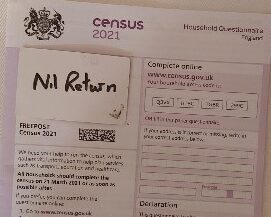25 March 2021
Nil Return
By J.R. Thomas
 “In those days a decree went out from Emperor Augustus that all the world should be registered. This was the first registration and was taken while Quirinius was governor of Syria. All went to their own towns to be registered.”
“In those days a decree went out from Emperor Augustus that all the world should be registered. This was the first registration and was taken while Quirinius was governor of Syria. All went to their own towns to be registered.”
So says the New Testament, in St. Luke chapter 2. Nothing has changed; governmental bureaucracy has always liked to know what is going on in its backyards. This 21st March, the British government renewed its decennial invitation to every UK household to complete the tasteful lilac form, with many and personal details of every person present in the household that day. 32 pages of it, should you be married with three children. If granny lives with you or you were having a house party that day, you will need extra pages – and prepare for a police visit about breaches of lockdown. Or hopefully not, it seems. The leaflet with the form says that information is kept “safe and confidential by law for 100 years.” Anybody like to test that by including the names of ten visitors from different households? “What led you to call here, constable?” “Information received madam, information received, we are not allowed to disclose the source.”
The census takers – it should be the “Census”, but achingly modern urges have even overcome these custodians of an ancient tradition, who call it “census 2021”, somehow lessening its weight and making it sound like a new model Nissan – say, beguilingly, “We need your help to run the census, which gathers vital information to help plan services such as transport, education and healthcare.” It’s for your own good, see. We just want to lay on extra bus services, more laptops in schools, build friendly cottage hospitals. Just fill it in. It won’t take long. Just do it. Do it. Or else.
St Luke knew what the “or else” was all about. The King James Bible of 1611 is clearer: “…from Emperor Augustus that all the world should be taxed” says Luke in that version, getting to the nitty gritty of what Augustus was up to. Taxing his far-flung empire was the point of recording all this information, messing up his subjects’ lives by making them go back to their towns of origin to be registered, and then squeezing their leather purses into the imperial coffers. No talk of better roads (unless needed for troop movements) or town centre improvement schemes (unless for the display of the might of Rome).
Census taking has become a little more sophisticated since the birth of Christ. Our government is asking for lots of information which we all know will not lead to anything much by the way of improved services, but may well be used to for tax gathering purposes. Not income tax, which there is no avoiding now and where the government generally gets its hand on our earnings even before we do. But council tax and toll fees on roads and bridges and VAT on classes of goods and all those sorts of taxes, taxes we often barely notice or think of as taxes, can be usefully adjusted (upwards normally) by the gathering of information as to who and where and what.
That is only the start of it. The government would like to know all about your house, your central heating, your marital arrangements, your health, work, cars (or vans, white or otherwise), holiday home arrangements, sexuality and gender, religion. Historians of the 22nd century may ponder on the nature of a society that insists on knowing your ethnic group (by law) but leaves your religion as a voluntary question. Somehow, the country managed to survive in 1921 without asking either question, or indeed without most of the answers now sought.
The first census was taken in 1801. As with many governmental initiatives, the reason given was national emergency – in this case the Napoleonic wars, where the government were anxious to discover how many men of fighting age and capability were available. That must have been a real incentive to fill it in correctly. Once started there was no stopping; every ten years the process was repeated, with that gradual growth in size and intrusion that we know well. There was no census in Ireland in 1921 due to other distractions in that fair land, nor in Britain in 1941 (war again, but this time the government knew how many persons of fighting fitness were available). Rather more oddly, there is no census in Scotland this year (it will happen in a year’s time). Ms Sturgeon blames this on Covid19, though quite how this impacts an online form, or where paper, dealt with by post, has not been made clear. Cynics will say that it is vital to Ms Sturgeon’s sense of self worth that a Scottish census be held at a different time to that of England. Surely not.
There was an extra census in 1966, under Harold Wilson’s administration, but it did not prove popular and was not repeated. There has always been a certain amount of resistance to filling in the forms, and this has tended to grow with the length of the form. Some folk object to the very principle of a census at all, but most simply object to one or two of the questions. The big trouble maker this time seems to have been Q27: “Is the gender you identify with the same as your sex registered at birth?” which seems relatively harmless and does not enquire as to what surgery you may have had, or how you dress in public, and is in any case voluntary. In the past the religion question has caused trouble, Q16 this time, and in 2001 390,127 respondents informed the census takers that they were Jedi Knights. This was of course ridiculous; we all know that to become a Jedi Knight takes years of training and is a rare honour, not one available to 400,000 or so people. The government, having spotted the trend, side stepped the issue by making the religion question voluntary, though one wonders how many Jedi Knights took advantage of the dispensation and did not answer the question.
Question 19 is your correspondent’s favourite this time round: “How well can you speak English?” Those ticking the box “Not at all” will presumably get a visit from a Census Inspector, asking how, in that case, they understood the question, and indeed the rest of the form.
But we have gone off track. Should there be a census, and what questions should it ask? Anything that begins, as the website introduction does: “Your information is safe with us” probably makes any cynical citizen inclined to give misleading answers; especially when the 2011 census assured form fillers that the census information was protected from being “accessed by US authorities”. Why? And who was it not so protected from? It can and is argued that a modern state needs reliable information to make informed decisions. Maybe it does, but there are so many sources of information available in this technological age it is doubtful what extra helpful data the ten yearly snoop provides. It does however tend to pry into things that really are not the place of civil servants (or even your descendants in a century’s time). Some of these questions are voluntary, it is true, but that even more might make a citizen wonder what the point of the question is. The urge to snoop is very human; the census gives it legitimate form for government. Does it do any harm? Perhaps not, though old Augustus knew the value of it.


